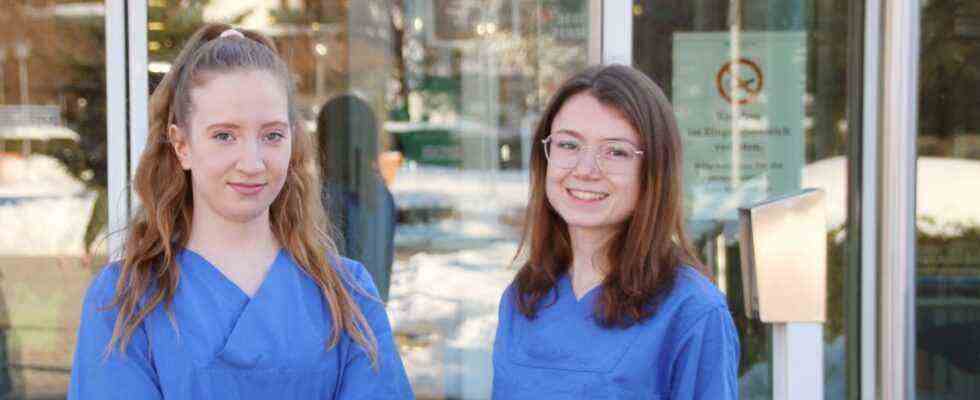2100 hours of theory lessons and around 2500 hours of practical training – that’s how extensive the workload for the 20 graduates of the three-year training course to become health and nurses at the nursing vocational school of the Asklepios Nursing School was. They were recently dismissed. The two best of the year, Laura Varaljai (20) and Stephanie Müller (23), are particularly happy: the government of Upper Bavaria awarded both of them because of their top marks with the city clinic, Felix Rauschek, and the mayor of Tölz, Ingo Mehner (CSU), presented the award. Varaljai and Müller are now starting their professional lives in the intensive care unit in Bad Tölz.
SZ: Ms. Varaljai, Ms. Müller, what does it mean to receive the Bavarian State Prize from the government of Upper Bavaria?
Stephanie Mueller: I am proud of myself. I put a lot of work into the training to get good grades. We each received 75 euros as a prize from the Bavarian government. We got the “Tölzer Prügel” chocolates from Café Schuler.
Laura Varaljai: I think that’s where you can see the success of what you’ve achieved in recent years. It is a huge credit to the government, the school and management. You can be proud of yourself. That good finish doesn’t come around every day.
Why did you decide to train as a nurse?
Miller: I only have an FSJ (voluntary social year, Note d. editor) made in nursing. That’s when I realized that the work is very diverse. Here you can see the medical and social components, but you also have contact with the people and what is behind them. You not only see the diagnosis, but also how they are private. I like the working hours, including the shift work.
Varaljai: Many of my family work in the medical field. When I was 13, I did an internship at the hospital in Bad Tölz. That was key to knowing it was right for me.
What skills do you bring to this job??
Müller: I think I’m resilient; that’s important in the job. Also with a view to the shift work and the mental stress. I also have empathy. I’m good with people because I have a calm demeanor. I think that helps the patient.
Varaljai: I think you need a lot of patience because we have a wide variety of patients. But you also have to be understanding. Humor is important, otherwise you won’t get through some days.
Were there moments when you wanted to give up everything?
Müller: I have to say that I’m relatively satisfied most of the time. But there were days when everything was stressful and I thought to myself, why am I actually doing this? But it helps if you can talk to your colleagues about it.
Varaljai: There were really brutal days when I couldn’t even go to the toilet. I ran for eight hours. But I didn’t want to give up on those days either.
How did you manage to get this very good degree?
Müller: I learned from the start, that was important. I’m interested in nursing, it was easier to learn than physics at school, for example.
Varaljai: Interest is half the battle. I didn’t learn that much at all. I was interested in it and took a lot with me on the ward. But the lessons were great too.
What is your opinion on the generalization of the nursing profession?
Müller: I think it’s good when people think about how vocational training can be developed. But it was a burden for the schools to switch everything, I think. If you’re in the hospital first and then go into geriatric care, then many decide to go to the hospital.
Varaljai: On the one hand, I think it’s good. You get to know many areas: hospitals, old people’s homes or children’s clinics. We also did children’s clinics, but not in as much detail. Then you can make a better decision. But I think elderly care is so disadvantaged. There will be a shortage of staff there, I think.
How do you feel about the Corona protests?
Müller: I think it’s good when people think critically about vaccination. But you have seen how many people have been in the hospital or died there in the last two years. There were many fears about the corona vaccination. Vaccination damage also occurs with other vaccinations. For many it is a general opposition. Because when people go on vacation and fly to South Africa, for example, they also get travel vaccinations, for example against rabies.
Varaljai: I think it’s really awesome to see that. I work in the hospital and I see what’s going on there every day. We experience it in the intensive care unit. It’s bad to see that patients deny Corona and days later have to be ventilated. All vaccinations carry risks. There is always a risk of late effects.
What do you like to do in your free time?
Müller: I really like going to the mountains. Hiking or skiing, that’s my balance.
Varaljai: I also really like skiing and I spend a lot of time in nature and go for walks. That’s a very good balance.
How do you deal with the psychological stress?
Müller: For me it is important to meet friends, to go to a café or to the cinema. And not to think about work. But I can also switch off easily in the mountains.
Varaljai: I think you have to distract yourself after work. I try to separate work and private life. Walking after work does a lot to wind down. But it also helps a lot to talk to colleagues about it if something is bothering you.

